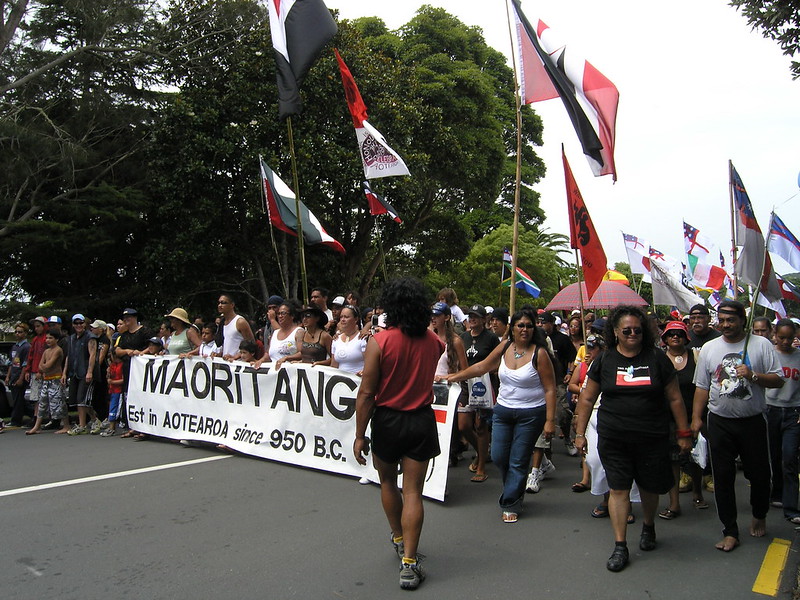Position paper on indigenous peoples’ rights and protections
Ngā Toki Whakarururanga | 5 September 2023
Position paper on indigenous peoples’ rights and protections
IPEF - Bangkok Round, September 2023
Ngā Toki Whakarururanga brings a Te Tiriti o Waitangi perspective to the trade policy space, which requires the Government of Aotearoa New Zealand (the Crown) to uphold and actively protect Māori rights to exercise authority over our lands, waters, resources and all taonga, including the ecosystem, as well as Māori laws, beliefs and philosophies. That includes for IPEF.
INDIGENOUS PEOPLES’ RIGHTS, DUTIES AND RESPONSIBIILTIES
Indigenous Peoples’ have enduring responsibilities as kaitiaki or custodians of the world we have inherited, and of which we are an inseparable part, and the duty to protect its wellbeing for future generations.
In Aotearoa New Zealand, Te Tiriti o Waitangi guarantees Māori will continue to exercise self-determination and self-governance (rangatiratanga) over our people, resources, and way of life, while the English settler government exercises delegated authority over its own.
This includes the international domain of trade policy and negotiations. The Waitangi Tribunal’s report Ko Aotearoa Tenei (Wai 262) said explicitly that
“some matters are of such central importance to Māori that it is appropriate, in the light of theTreaty relationship, to move only with Māori acquiescence or consent” and that “it is possible [forthe Crown] to contemplate circumstances in which it may be necessary to place the Māori voice asthe New Zealand voice in the international arena”
This right extends to all Indigenous Peoples who are impacted on by IPEF negotiations and outcomes. Globally, the United Nations Declaration on the Rights of Indigenous Peoples (UNDRIP), which many IPEF participating governments have signed, sets out the minimum standards of rights for Indigenous Peoples.
These include cultural, political, economic, and environmental rights, our right to determine our own priorities and strategies for development, and the right to participate in decision-making that would affect our rights through representatives of our choice, such as IPEF.
STATE OBLIGATIONS OF ACTIVE AND EFFECTIVE PROTECTION IN IPEF
Despite our requests, Māori and other Indigenous Peoples have not been accorded direct independent representation in the IPEF negotiations to ensure that our perspectives are received and considered as accurately an authentically as they are given.
Nor do we have any guarantee that our rights, responsibilities, duties, and interests will be effectively protected in IPEF to enable us to exercise our rangatiratanga (self-determination).
Without a direct avenue to influence negotiations, it is imperative that the negotiating IPEF parties agree to effective protections across all four pillars that guarantee they can deliver on their obligations to Indigenous Peoples under the legal, constitutional, Treaty or other constructive arrangements to which they are a party.
That needs to take the form of a carveout from the scope of IPEF. We propose a variation on the Indigenous Peoples’ exception Aotearoa New Zealand proposed in the Joint Statement Initiative on Electronic Commerce:
Article [x] Indigenous Peoples
1. This Agreement does not apply to measures that a Party adopts or maintains, in partnership with Indigenous Peoples in its territory, that it deems necessary to protect or promote duties, responsibilities, rights and interests of those Indigenous Peoples, including in fulfilment of its obligations under its domestic or international legal, constitutional, Treaty or other constructive arrangements with those Indigenous Peoples.
2. The Parties agree that the interpretation of a Party’s legal, constitutional, Treaty or other constructive arrangements with Indigenous Peoples in its territory, including as to the nature of rights and obligations under it, shall not be subject to any dispute settlement provisions in this Agreement.
This would confer an equivalent protection for Indigenous Peoples’ within State’s territories as Parties have adopted for their own national security.
WEAKNESSES IN OTHER INDIGENOUS RIGHTS EXCEPTIONS
We propose the following variation on the Indigenous Peoples’ exception that Aotearoa New Zealand has proposed in the Joint Statement Initiative on Electronic Commerce at the WTO:
- An exception needs to be involved as a defence in a dispute, rather than a carveout which should prevents a dispute and puts the onus on the objector.
- The chapeau “arbitrary or unjustifiable discrimination or a disguised restriction on trade in goods, services and investment”, as in the US Mexico Canada Agreement (Art 32.5), may often arise, eg where Māori digital services providers benefit because data must be held in Aotearoa New Zealand.
- The chapeau also privileges commercial interests over Indigenous Peoples’ duties, responsibilities, rights and interests, subjects them to challenge by another State, and relies on interpretations by arbitral panels of trade law experts.
- The USMCA exception only applies to measures where there is a legal obligation to Indigenous Peoples, but not obligations that are sourced in constitutional instruments that have ambiguous legal status under colonial law, as with Te Tiriti o Waitangi, or some would argue obligations under the UNDRIP.
- An exception that applies only to measures that confer “more favourable treatment” on IndigenousPeoples (as per the Treaty of Waitangi Exception in many FTAs) does not provide effective protection for non-compliance with a provision or a measure that advances Indigenous Peoples’ protections as part of broader public policy measures. The phrase also opens reliance on the exception to challenge as not constituting “more favourable treatment”.
- These uncertainties can chill a Party’s willingness to implement measures sought by Indigenous Peoples to avoid the risk of dispute and potential sanctions. Rights of prior comment under “good regulatory practice” or “services domestic regulation” provide opportunities to threaten such action.
RECOMMENDATION
Adopt a carveout from scope across each IPEF pillar to ensure that state parties retain the policy space to meet their domestic and international obligations to Indigenous Peoples in their territories.






